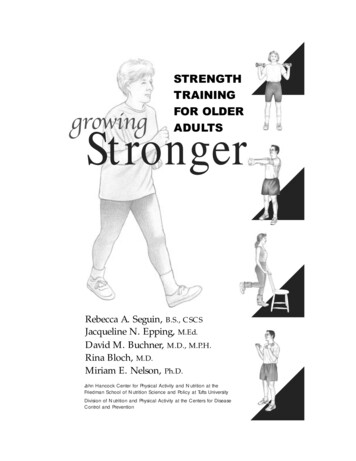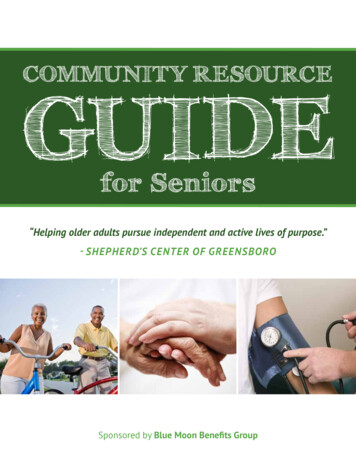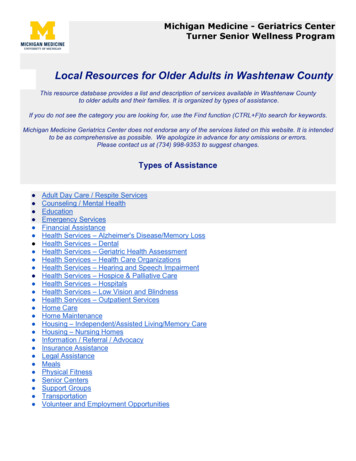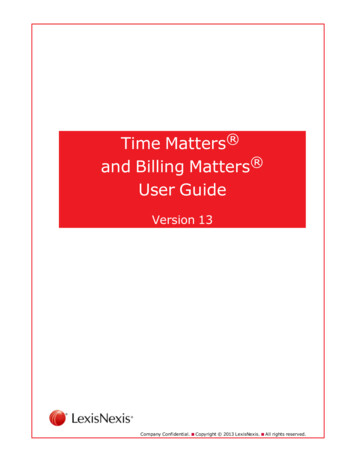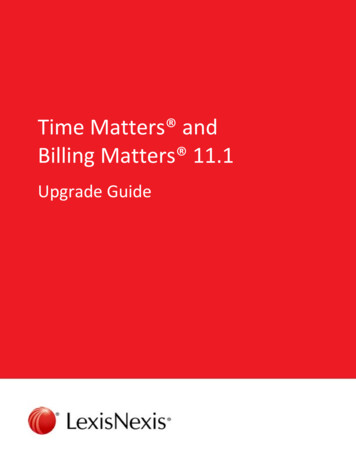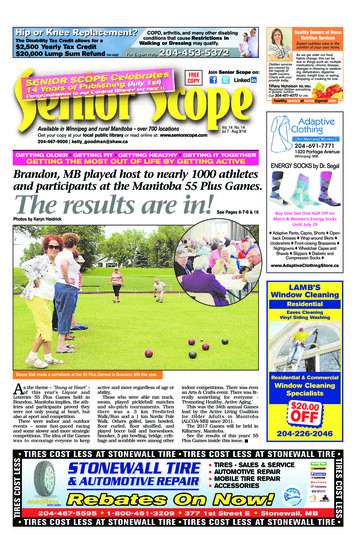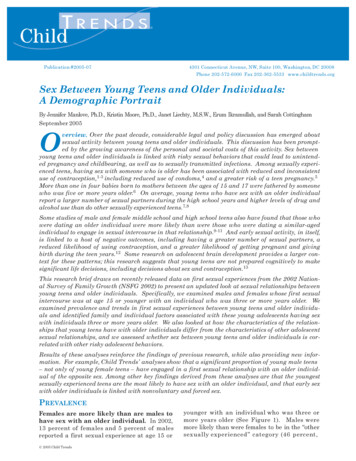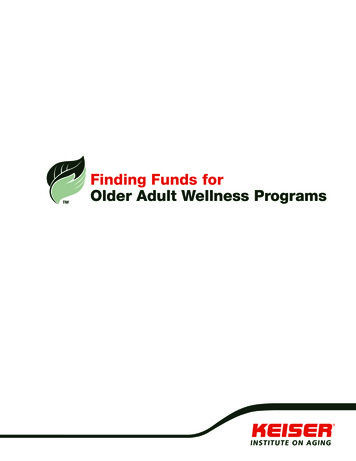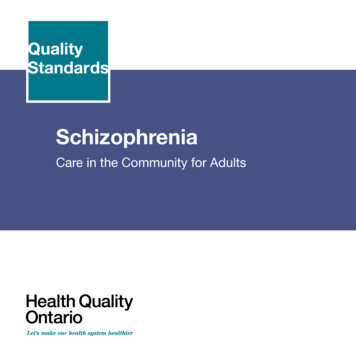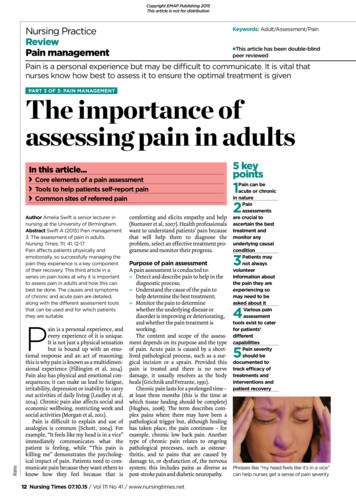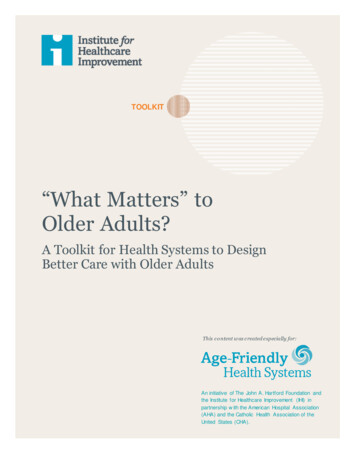
Transcription
TOOLKIT“What Matters” toOlder Adults?A Toolkit for Health Systems to DesignBetter Care with Older AdultsThis content was created especially for:An initiative of The John A. Hartford Foundation andthe Institute for Healthcare Improvement (IHI) inpartnership w ith the American Hospital Association(AHA) and the Catholic Health Association of theUnited States (CHA).
Authors:Mara Laderman, MSPH: Director, IHIClark Jackson, MPH: Research Associate, IHIKev in Little, PhD: Principal, Informing Ecological Design, LLC, and IHI FacultyTam Duong, MSPH: Senior Project Manager and Research Associate, IHILeslie Pelton, MPA: Senior Director, IHIAcknowledgments:This work was supported by a grant from The SCAN Foundation. The SCAN Foundation works toadvance a coordinated and easily navigated system of high-quality services for older adults thatpreserve dignity and independence. For more information, visit www.TheSCANFoundation.org.This work was also made possible by The John A. Hartford Foundation, a private, nonpartisan,national philanthropy dedicated to improving the care of older adults. For more information, visitwww.johnahartford.org.IHI would like to thank our partners, the American Hospital Association (AHA) and the CatholicHealth Association of the United States (CHA), for their leadership and support of th e AgeFriendly Health Systems initiative. Learn more at ihi.org/AgeFriendly.We would also like to thank the following individuals who provided guidance and critical reviewthrough the development of this toolkit: Gretchen Alkema, Lil Banchero, Len Barry, Kevin Biese,Maureen Bisognano, Susan Block, Joan Chaya, Lenise Cummings-Vaughn, Claire Curtis, KateDeBartolo, Susan Edgman-Levitan, Lindsay Gainer, Damara Gutnick, Daniela Lamas, JenniferLiu, Catherine Mather, Kelly McCutcheon Adams, VJ Periyakoil, Pat Rutherford, Lauge SokolHessner, Mary Tinetti, Matthew Tremblay, Erin Westphal, and Angela Zambeaux. Thank you tothe five prototype health systems — Anne Arundel Medical System, Ascension, Kaiser Permanente,Providence St. Joseph, and Trinity — for stepping forward to learn what it takes to become an AgeFriendly Health System. Finally, our deepest gratitude to Pat McTiernan and V al Weber of IHI fortheir support in editing this toolkit. The authors assume full responsibility for any errors ormisrepresentations.For more than 25 years, the Institute for Healthcare Improvement (IHI) has used improvement science to advance and sustain better outcomes in healthand health systems across the world. We bring awareness of safety and quality to millions, accelerate learning and the systematic improvement of care,develop solutions to previously intractable challenges, and mobilize health systems, communities, regions, and nations to red uce harm and deaths. Wework in collaboration with the growing IHI community to spark b old, inventive ways to improve the health of individuals and populations. We generateoptimism, harvest fresh ideas, and support anyone, anywhere who wants to profoundly change health and health care for the bet ter. Learn more at ihi.org.Copyright 2019 Institute for Healthcare Improvement. All rights reserved. Individuals may photocopy these materials for educational, not -f or-profit uses, provided that thec ontents are not altered in any way and that proper attribution is given to IHI as the source of the content. These materials may not be reproduced for c ommercial, for -profituse i n any form or by any means, or republished under any circumstances, without the written permission of the Institute for Healthcare Improvement.
Contents“What Matters” to Older Adults: The Basis of Age-Friendly Health Care4The Age-Friendly Health Systems Initiative6Important Considerations for “What Matters” Conversations8Who Should Initiate a “What Matters” Conversation11What to Discuss in a “What Matters” Conversation12How to Prepare Older Adults and Caregivers for a “What Matters” Conversation14How to Conduct an Effective “What Matters” Conversation15Documenting “What Matters” Information18Incorporating “What Matters” Information into the Care Plan21Measuring “What Matters”22Conclusion26Case Examples27Appendix A: Resources to Support “What Matters”Conversations with Older Adults29Appendix B: Examples of “What Matters” Conversations31Appendix C: Detailed Information on “What Matters”Process and Outcome Measures32Appendix D: A Multicultural Tool for Getting to KnowYou and What Matters to You36References38Institute for Healthcare Improvement ihi.org 3
TOOLKIT: “What Matters” to Ol der Adults? A Tool kit for Health Systems to Design Better Care with Older Adults“What Matters” to Older Adults: The Basisof Age-Friendly Health CareIn March 2012, Michael Barry, MD, and Susan Edgman-Levitan, PA, introduced the concept ofasking patients “What matters to you?” in addition to asking “What is the matter?” Their goal wasto increase providers’ awareness of critical issues in their patients’ lives that could drivecustomized plans of care. Since then, the Institute for Healthcare Improvement (IHI) and otherorganizations around the world have been encouraging providers and health care organizations toask patients and their caregivers about “What Matters” to them to inform their care. 1IHI’s past work on The Conversation Project2 and Conversation Ready3 has sought to encourageindividuals, families, and health systems to have conversations about “What Matters” in thecontext of end-of-life care. The Age-Friendly Health Systems initiative builds upon IHI’s previouswork in shared decision making, expanding the asking of “What Matters” beyond the context ofend-of-life care to all care with older adults across their lifespan. “What Matters” is the foundationof the Age-Friendly Health Systems initiative, which in its entirety encompasses four evidencebased elements of care for older adults — What Matters, Medication, Mentation, and Mobility.Institute for Healthcare Improvement ihi.org 4
TOOLKIT: “What Matters” to Ol der Adults? A Tool kit for Health Systems to Design Better Care with Older Adults The Age-Friendly Health Systems initiative defines “What Matters” as knowing and aligningcare with each older adult’s specific health outcome goals and care preferences including,but not limited to, end-of-life care, and across settings of care. Health outcome goals relate to the values and activities that matter most to an individual,help motivate the individual to sustain and improve health, and could be impacted by adecline in health — for example, babysitting a grandchild, walking with friends in themorning, or volunteering in the community. When identified in a specific, actionable, andreliable manner, patients’ health outcome goals can guide decision making. Care preferences include the health care activities (e.g., medications, self-management tasks,health care visits, testing, and procedures) that patients are willing and able (or not willing orable) to do or receive.The aim is to align care and decisions with the older adult’s health outcome goals.Within the Age-Friendly Health Systems initiative, the “What Matters” element ensures ongoingcommunication and relationship building with older adults and their caregivers. Instead of onetime conversations between older adults and clinicians, “What Matters” conversations should takeplace at multiple points of care (e.g., annual visits, major life events, or changes in health status)and be coordinated among all members of the care team.Operationalizing a system to understand, document, and act on “What Matters” to older adults inhealth care organizations requires organizational culture change as well as clinician training andspecific changes to workflows and the electronic health record. “What Matters” is of greatimportance to older adults, caregivers, and the health care workforce.Note that aligning care to each patient is still a relatively new concept, particularly for patients whoare not seriously ill or near the end of life. This toolkit brings together the best available evidencefrom health systems around the world to help guide the testing and implementation of thisimportant concept in your local health system.The toolkit is intended to serve as a resource for multidisciplinary care teams, including, butnot limited to, physicians, nurses, physician assistants, medical assistants, social workers,chaplains, nurse navigators, community health workers, and trained volunteers. The toolkitprovides actionable steps and guidance to ensure that every older adult’s health outcome goalsand care preferences are understood, documented, and integrated into their care by the entirehealth care team.Institute for Healthcare Improvement ihi.org 5
TOOLKIT: “What Matters” to Ol der Adults? A Tool kit for Health Systems to Design Better Care with Older AdultsThe Age-Friendly Health Systems InitiativeWhat Are Age-Friendly Health Systems and Why AreThey Important?Three factors that impact caring for older adults in the United States today are occurringsimultaneously. Together, the factors make a compelling case for health systems to better supportthe needs of older adults and caregivers: Demography: The number of adults over the age of 65 years is projected to double over thenex t 25 years. Complexity: Approximately 80 percent of older adults have at least one chronic condition,and 77 percent have at least two. Disproportionate Harm: Older adults have higher rates of health care utilization ascompared to other age groups and experience higher rates of health-care-related harm, delay,and discoordination.Becoming an Age-Friendly Health System entails reliably providing a set of specific, evidencebased best practice interventions to all older adults, as needed, in your health system. This isachieved primarily through redeploying existing health system resources to achieve:Institute for Healthcare Improvement ihi.org 6
TOOLKIT: “What Matters” to Ol der Adults? A Tool kit for Health Systems to Design Better Care with Older Adults Better health outcomes for this population Reduced waste associated with low-quality, unwanted, or unneeded services Increased utilization of cost-effective services for older adults Improved reputation and market share with a rapidly growing population of older adultsThe “4Ms” Framework of an Age-Friendly Health SystemIn 2017, The John A. Hartford Foundation and IHI, in partnership with the American HospitalAssociation (AHA) and the Catholic Health Association of the United States (CHA), launched theAge-Friendly Health Systems initiative, which set the bold aim that 20 percent of US hospitals andhealth systems would be Age-Friendly Health Systems by December 2020.The 4Ms Framework that emerged from the Age-Friendly Health Systems initiative is bothev idence-based and able to be put into practice reliably in the health care setting. The 4Ms are: What Matters: Know and align care with each older adult’s specific health outcome goalsand care preferences including, but not limited to, end-of-life care, and across settings of care. Medication: If medication is necessary, use age-friendly medication that does not interferewith What Matters to the older adult, Mentation, or Mobility across settings of care. Mentation: Prevent, identify, treat, and manage dementia, depression, and delirium acrosssettings of care. Mobility: Ensure that older adults move safely every day in order to maintain function anddo What Matters.The 4Ms are the essential elements of high-quality care for older adults and, when implementedtogether, indicate a broad shift by health systems to focus on the needs of older adults. Reliableimplementation of the 4Ms is supported by board and executive commitment to becoming an AgeFriendly Health System, engagement of older adults and caregivers, and community partnerships.“What Matters” as the Basis of Age-Friendly CareIn the Age-Friendly Health Systems initiative, “What Matters” to the older adult is the basis for therelationship with the care team and shapes the care that is provided. “What Matters” integratescare and decision making across care settings. “What Matters” is not limited to end-of-lifeplanning. It is therefore essential to the older adult, the care team, and the health system that“What Matters” to each older adult is identified, understood, and documented so it can be actedupon, and updated across settings of care following changes in care or life events.While fundamental to person-centered care, the practice of “What Matters” is the least developedof the 4Ms. Because of its importance, and the need for further development in practice, this “WhatMatters” to Older Adults Toolkit was developed by IHI with support from The SCAN Foundation.Bringing together the best available evidence from health systems around the world, the toolkit is astarting place and an invitation to learn together how to better understand and act upon “WhatMatters” to older adults and measure progress in doing so.Institute for Healthcare Improvement ihi.org 7
TOOLKIT: “What Matters” to Ol der Adults? A Tool kit for Health Systems to Design Better Care with Older AdultsImportant Considerations for “What Matters”ConversationsUnderstanding “What Matters” is an ongoing process, built on strong relationships between careteam members and older adults. While there are some critical moments when an older adult’shealth and care goals and preferences may need to be elicited or redefined, understanding “WhatMatters” requires a series of conversations over time that become the guide for how care isdelivered. There two considerations for “What Matters” conversations, as described below.1. “What Matters” Conversations at Certain Care TouchpointsCare touchpoints for older adults such as regular visits, annual wellness visits, a new diagnosis, alife-stage change, ongoing chronic disease management, and inpatient visits present opportunitiesfor “What Matters” conversations (see Figure 1). These types of care interactions tend to be timelimited and specific to a clinical interaction. “What Matters” conversations can and should takeplace in various settings, including inpatient hospital, primary care, cancer care, skilled nursingfacility or nursing home, home-based care, and specialty services such as rehabilitation.Institute for Healthcare Improvement ihi.org 8
TOOLKIT: “What Matters” to Ol der Adults? A Tool kit for Health Systems to Design Better Care with Older AdultsFigure 1. Care Touchpoints When “What Matters” Conversations Might OccurRegular and Annual Wellness Visits A longer annual w ellness visit can be conducive to an initial “What Matters”conversation. Regular w ellness visits are also an excellent opportunity to continue“What Matters” conversations over time.New Diagnosis or Change in Health Status Schedule an initial “What Matters” conversation one w eek after the older adult hasreceived a new diagnosis or change in health status, and use this information w henplanning a course of care.Life-Stage Change Initiate a “What Matters” conversation during a primary care appointment w ith anolder adult w ho has just entered retirement or enrolled in Medicare. Review “WhatMatters” information at each visit follow ing the life-stage change for any updates onthe older adult’s care.Chronic Disease Management Discuss “What Matters” during primary care visits, revisiting past conversations anddiscussing any changes or updates to the older adult’s goals and preferences.Inpatient Visits (hospital, nursing home, skilled nursing facility) Ask older adults w hat is important to them at every hospitalization and document anynew information.Note that asking older adults about “What Matters” can be difficult in the emergency department(ED), when decisions need to be made quickly to address the urgent issue at hand. Rather thaninitiating “What Matters” conversations in the ED setting, ED care teams are more likely“customers” of this information, using it to guide care decisions, particularly as patients in the EDmay not be able to communicate their goals and preferences during an emergency encounter.Documenting “What Matters” information consistently and making it easily and clearly accessibleto clinicians in all settings are the most important factors in ensuring patients’ “What Matters”preferences are known and respected in the ED.2. “What Matters” Conversations as Part of Routine andRecurring CareConsistently incorporating “What Matters” as part of discussions between older adults andclinicians is a key part of relationship-based care. These conversations might be broad (e.g., “Mygrandchildren and knitting are important to me”) or specific (e.g., “I am worried I will be too weakto attend a family reunion I’ve been looking forward to next month”).“What Matters” conversations may be more effective and actionable if anchored to somethingthe older adult cares about, by connecting their goals and preferences to the impacts of careand care decisions. “What Matters” conversations must also take into consideration cognition,health status, and identity.Institute for Healthcare Improvement ihi.org 9
TOOLKIT: “What Matters” to Ol der Adults? A Tool kit for Health Systems to Design Better Care with Older AdultsCognitionThe care team must consider how older adults’ cognitive status does, and does not, impact theirability to engage in meaningful conversations about their goals and preferences. Some cliniciansmay think an older adult with cognitive impairment is not capable of a “What Matters”conversation, and thus will not introduce the opportunity or will only speak with the familyor caregiver.Older adults living with cognitive impairment and dementia are often capable of expressing theirgoals and preferences and should participate in “What Matters” conversations to the degreepossible. It is the care team’s responsibility to get to know each older adult and engage with him orher directly. Careful consideration should be given to the timing of “What Matters” conversations.There may be times of the day when the older adult is more lucid (e.g., earlier in the day). If thereis significant cognitive impairment, the most important aspect of “What Matters” may be findingout who the older adult relies most on to help make decisions. The guiding principle is to maximizeautonomy of cognitively impaired older adults and not diminish their self-image (e.g., “changes incognition” v ersus “cognitive impairment”).4Health StatusOlder adults’ goals and preferences will likely change over time as health status changes. Whatmatters most to someone who is functionally independent and has few health problems will differfrom someone with functional disabilities and a heavy disease burden. Accordingly, the “WhatMatters” conversations to understand older adults’ goals and preferences may need to vary basedon health status.IdentityIt is critical to consider the impact of race, ethnicity, language, religion, culture, and otheridentities on how older adults view health and illness, and their preferences and willingness toengage in conversations about “What Matters.” Issues of trust between some populations (e.g.,communities of color, the LGBTQ community) and the health care system, borne of pastex periences and historic mistreatment, can affect “What Matters” conversations.Clinicians are also at risk of expressing their own unconscious biases, which may manifest in subtlev erbal and nonverbal ways that can alienate patients. Without trust, it is challenging to trulyunderstand “What Matters” to inform a treatment plan that incorporates the older adult’s goalsand care preferences.“What Matters” conversations can open the door to more culturally competent, affirming, andhumble care, as clinicians become better informed about the life and cultural contexts of each olderadult. We recommend that all clinicians undergo training on implicit bias as part of theirpreparation for having “What Matters” conversations, using tool
based elements of care for older adults — What Matters, Medication, Mentation, and Mobility. . time conversations between older adults and clinicians, “What Matters” conversations should take place at multiple points of care (e.g., annual vi
